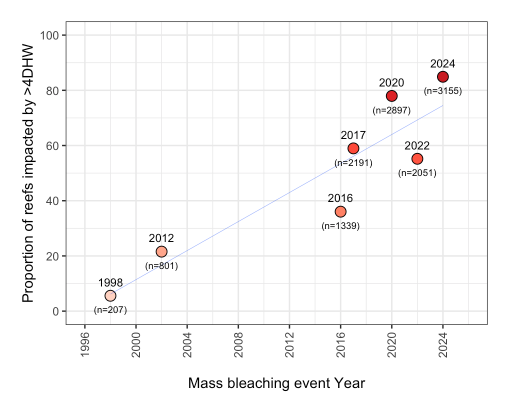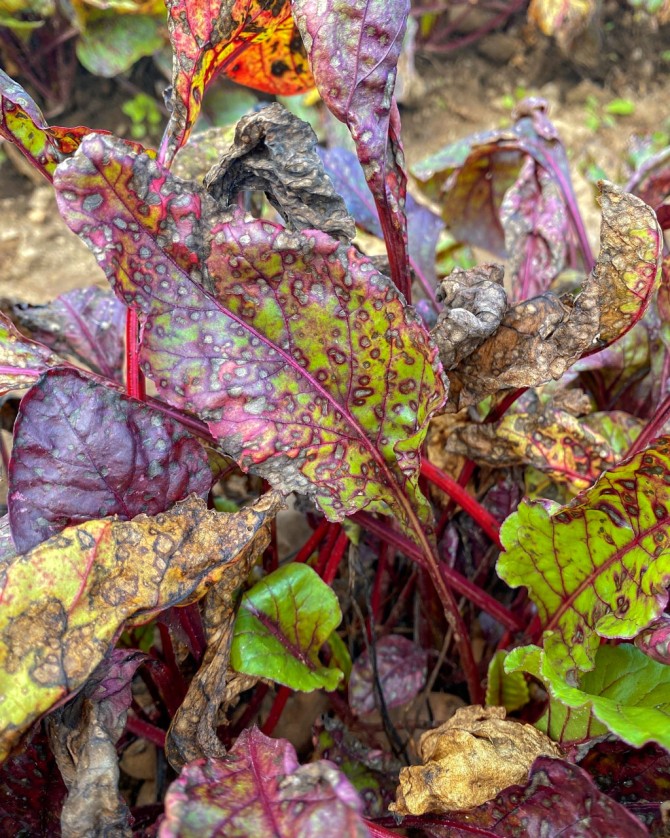New data shows the Great Barrier Reef has suffered through its worst-ever heat stress with more than 80% of reefs enduring dangerous levels of heating (more than 4 Degree Heating Weeks), as scientists grapple to quantify the irreparable, cumulative damage from repeated such events.
Surveys show widespread coral bleaching affecting an area likened in size to the land burned during the Black Summer fires. Marine scientists have reported coral bleaching at greater depths of the ocean than previously recorded, and centuries-old corals succumbing to the extreme heat.
Reports from the Great Barrier Reef Marine Park Authority (GBRMPA), the National Oceanic and Atmospheric Administration (NOAA) in the United States, and other experts show that:
- The Great Barrier Reef as a whole has been subject to a greater level of heat stress than during any of the previous six mass bleaching events (See Figure 1).
- Almost half (46%) of the individual reefs that form the Great Barrier Reef experienced record heat stress. (Based on analysis of data from NOAA Coral Reef Watch.)
- More than 60% of individual reefs across the Great Barrier Reef have shown “prevalent bleaching” .
Figure 1: Proportion of individual reefs across the Great Barrier Reef that endured heat stress of more than 4 Degree Heating Weeks. Analysis provided to Climate Council, based on NOAA Coral Reef Watch. (Heat stress is measured in Degree Heating Weeks – DHWs. One week of water temperatures that are 1°C above average represents 1 DHW. One week of water temperatures that are 2°C above average would be 2 DHWs, and so on.)
This is the latest event in a slow-unfolding disaster that is fundamentally altering the Reef. Repeated mass bleaching events started occurring in the late 1990s due to marine heatwaves driven by climate pollution. Every part of the Great Barrier Reef has bleached at least once since then, with some areas bleaching four times with little recovery time. As a result the Great Barrier Reef is fading to a shadow of its former glory.
On Tuesday (Australian time), NOAA will issue an update on how coral reefs are being impacted around the world this year. GBRMPA is also shortly due to issue a snapshot of how the Great Barrier Reef has fared over the summer.
Climate Council CEO Amanda McKenzie said: “An underwater black summer is ravaging the treasured Great Barrier Reef right now. The survival of the Reef—and all life that depends on it—hinges on our willingness to drastically cut climate pollution in the 2020s, which means scaling up clean energy as quickly as possible so we can phase out coal, oil, and gas.
“While the Great Barrier Reef fades before our eyes, the Australian Government continues to wave through new coal, oil, and gas projects. Our national environment law is failing the very things it’s supposed to protect.
“Prime Minister Anthony Albanese and Environment Minister Tanya Plibersek need to do their jobs by protecting nature from climate change. The Australian Government has an opportunity to better protect iconic natural places like the Great Barrier Reef by fixing our national environment law.”
Dr Simon Bradshaw, Research Director at the Climate Council said: “Marine heatwaves, fuelled by climate pollution, have dealt blow after blow to the Great Barrier Reef. We’re likely now witnessing the most widespread and severe mass bleaching event ever recorded.
“Southernmost parts of the Reef, which had been largely spared previously, have been hit particularly hard this time, with bleaching affecting many more species, extending to greater depths, and affecting some of the oldest and most resilient corals.
“This is a disaster at our doorstep: a direct result of collective failure to cut climate pollution fast enough. Australia can accelerate the build out of renewable energy and move swiftly beyond fossil fuels so that we protect the places we all love and depend on before it’s too late.”
About us:
The Climate Council is Australia’s leading community-funded climate change communications organisation. We provide authoritative, expert and evidence-based advice on climate change to journalists, policymakers, and the wider Australian community.









